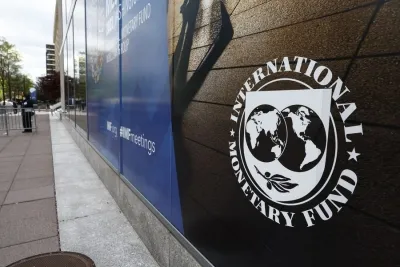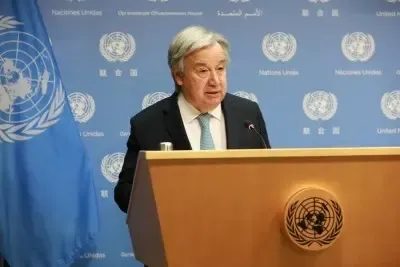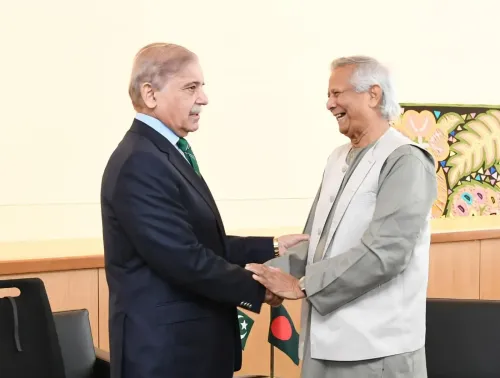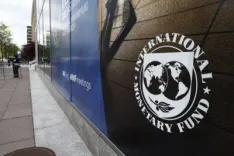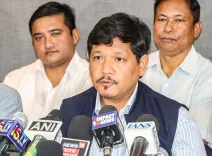What Opportunities Are Emerging from the India-Cyprus Discussions?
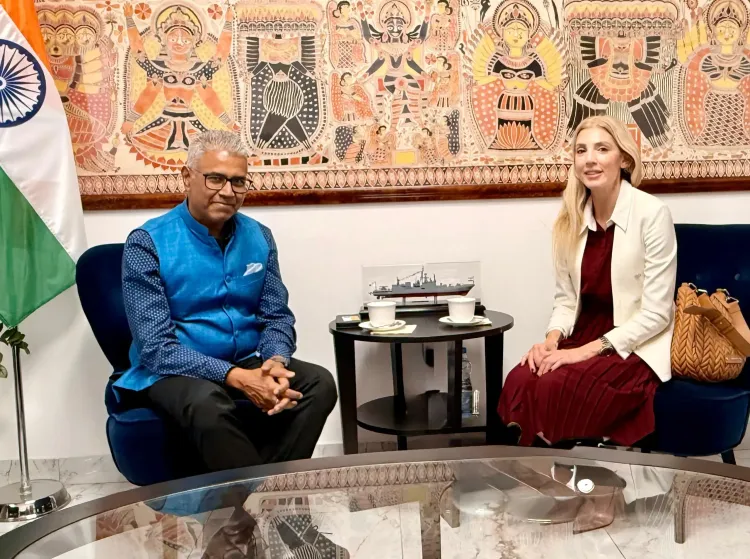
Synopsis
Key Takeaways
- Collaboration in education: Initiatives focused on innovation and technology.
- Strengthening bilateral ties: Importance of parliamentary exchanges.
- Joint Action Plan: Roadmap for future cooperation in various sectors.
- Historical visits: Significance of PM Modi's recent trip to Cyprus.
- Ongoing geopolitical context: Relations affected by international dynamics.
Nicosia/New Delhi, Nov 25 (NationPress) India's High Commissioner to Cyprus, Manish, engaged with Tonia Galati, the Head of Business Development and Innovation at The Grammar School in Nicosia on Tuesday. The meeting was centered on organizing the High Commission's involvement in the Grammar School Christmas Bazaar scheduled for December 7.
During their discussions, they explored potential partnerships in areas of shared interest, such as innovation and technology in education, health awareness initiatives, tourism, cultural promotion, and wellness programs. These fields present valuable prospects for enhancing collaboration between the Indian High Commission and the Grammar School community. The High Commissioner commended the school's progressive mindset and expressed a strong willingness to foster deeper cooperation, as shared by the Indian High Commission in Cyprus on X.
Earlier that day, in New Delhi, Vice President C P Radhakrishnan hosted a visiting parliamentary delegation from Cyprus, led by Annita Demetriou, President of the House of Representatives. Their talks focused on the bilateral relationship and the significance of ongoing parliamentary exchanges to fortify connections.
According to a statement from the Vice President's Office shared on X, "The Hon’ble Vice President of India and Chairman of the Rajya Sabha, Shri C. P. Radhakrishnan, held a meeting with a Parliamentary Delegation from Cyprus led by H.E. Ms. Annita Demetriou, today at Parliament House, New Delhi."
The discussions underscored the enduring bilateral relationship between India and Cyprus and the necessity for continued parliamentary exchanges to enrich ties between the two nations.
On October 30, External Affairs Minister (EAM) S Jaishankar and his Cypriot counterpart Constantinos Kombos reviewed the India-Cyprus Joint Action Plan 2025-2029 during their meeting in New Delhi.
EAM Jaishankar remarked that they deliberated on the global geopolitical landscape, regional developments, and collaboration in multilateral forums.
"It was a pleasure to welcome FM Constantinos Kombos of Cyprus in New Delhi today. We assessed the India-Cyprus Joint Action Plan 2025-2029, which the leaders agreed upon during PM Narendra Modi’s visit to Cyprus in June 2025. Our discussions also encompassed the global geopolitical situation, developments in our respective regions, and our cooperation in multilateral fora. With Cyprus preparing to assume the European Union Presidency in 2026, we are optimistic that India-EU relations will strengthen further," EAM Jaishankar stated on X.
This Action Plan serves as a roadmap for executing the Joint Declaration established during Prime Minister Modi's visit to Cyprus earlier this year, outlining short, medium, and long-term objectives in key cooperation areas, including defense, trade, and innovation.
Earlier in June, PM Modi made a historic two-day visit to Cyprus, marking the first visit by an Indian Prime Minister to the country in over two decades. Numerous agreements were signed during PM Modi's visit, and Cyprus President Nikos Christodoulides honored him with the Grand Cross of the Order of Makarios III at the Presidential Palace in Nicosia.
President Christodoulides also guided PM Modi along the ceasefire line in the historic city of Nicosia.
"Tour with Prime Minister Narendra Modi along the ceasefire line in old Nicosia, where the remnants of Turkish occupation remain apparent," the Government of the Republic of Cyprus shared on X, along with photos of the two leaders visiting the area.
PM Modi's visit held particular significance amid ongoing tensions between India and Turkey, stemming from Turkey's continuous support for Pakistan.
Turkey's acknowledgment of the so-called Turkish Republic of Northern Cyprus, established in the northern region occupied by Turkish forces since 1974, along with disputes over gas exploration rights in the Eastern Mediterranean, remains a source of ongoing tension between Turkey and Cyprus.


